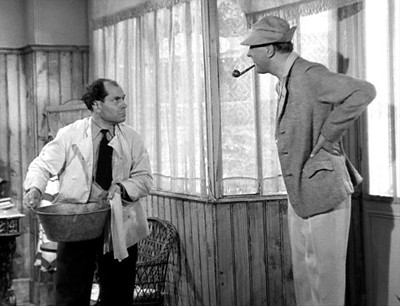With Jacques Tati, more than just about anyone else we’ve discussed, we really have to get into the weeds of what to do when the artist is a terrible human being. I deliberately don’t cover people I consider awful for these columns, for the most part, because I’d rather pay attention to better people when I can. I’ve been saying since I started Celebrating the Living that I’ll talk about Sean Connery when he actually dies, because while he’s iconic, he’s also a lousy person. He doesn’t need praise from me; lots of other people are taking care of that.
But Tati manages to be a remarkably iconic figure who also just isn’t discussed much. He directed a bare handful of films, all of which are routinely on lists of “films you should see,” and his films influenced all sorts of people, like Rowan Atkinson to Bill Plympton. If you look, you can see Tati’s influence in many more recent films, and of course there’s Oscar nominee The Illusionist, the animated one, which is from one of his scripts. Tati’s gentle physical humour took its roots from music hall, vaudeville and silent film, and he brought it into the sound era.
He also allowed his sister to persuade him to abandon an out-of-wedlock child. He had met a refugee named Herta Schiel, a dancer of Austrian and Czech descent who’d fled Vienna, at the Lido de Paris, where they were both working. She gave birth in 1942; he wouldn’t acknowledge the child and was basically forced out of the Lido. I don’t have a lot of detail, but Schiel and her sister would go on to be in the French Resistance, and Tati was essentially forced out of Paris entirely. Which seems unusual to me, over a matter of an illegitimate child, but no one’s giving me more detail.
I think the best we can do is be aware of how shamefully he treated his daughter, and of course her mother, and not cover that up. The films really are wonderful, but I can’t imagine how it must have felt to have been part of his personal life in that fashion. He married two years after his daughter’s birth, and I wonder if his wife knew. I don’t see how she could have not known, really. By the sound of it, it was common knowledge in Paris, though that does also seem to be part of why his first movies weren’t made there.
Of course, one of the nice things about his movies is that they don’t take much translating. Most of what I’ve seen appears to merely be mild silliness in dealing with other people and modern technology. It’s not crazed mugging. It’s not, obviously, a lot of wordplay; M. Hulot’s Holiday might as well be silent for half the movie, really. I keep wanting to use the word “gentle,” and I doubt I’m the only person who finds it the perfect adjective for his films. I’ll admit I do find him a bit more of a Luddite than I care for, but I can imagine that living through World War II would give you a negative view of modern technology.
Help support my children; consider supporting my Patreon or Ko-fi!

